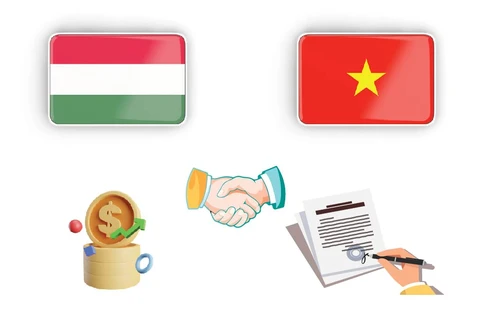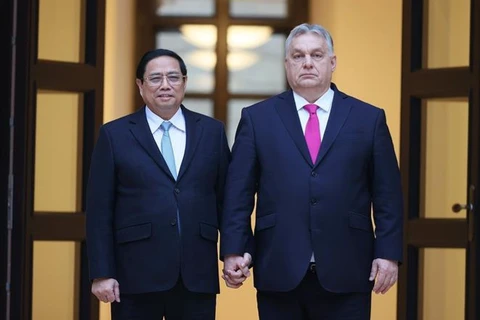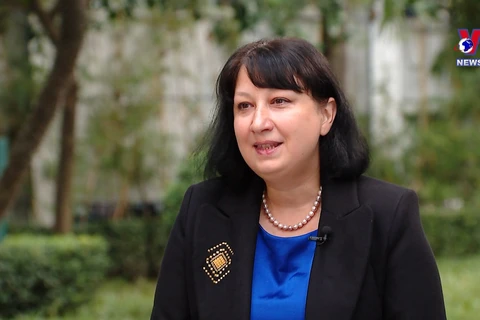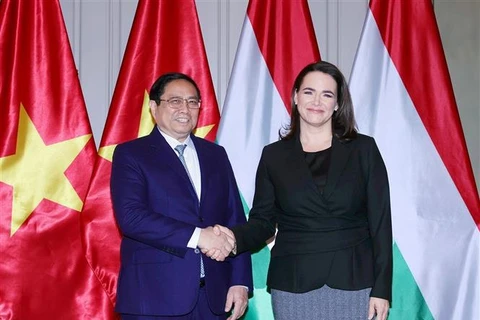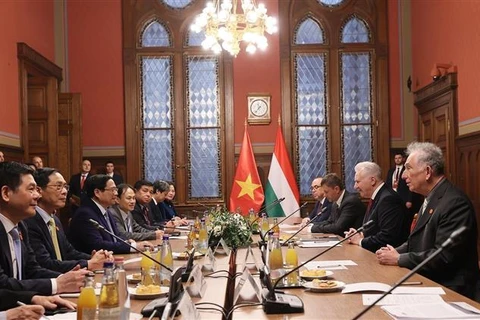 Prime Minister Pham Minh Chinh speaks at the Vietnam-Hungary business forum in Budapest on January 19 (local time)(Photo: VNA)
Prime Minister Pham Minh Chinh speaks at the Vietnam-Hungary business forum in Budapest on January 19 (local time)(Photo: VNA) Budapest (VNA) – Prime Minister Pham Minh Chinh and his Hungarian counterpart Viktor Orbán attended a Vietnam-Hungary business forum in Budapest on January 19 (local time).
The event was co-hosted by the Vietnamese Ministry of Planning and Investment, the Vietnamese Embassy in Hungary, and the Hungarian Export Promotion Agency.
In his speech, PM Chinh said after nearly 40 years of renovation, Vietnam has transformed from a impoverished, war-torn country into one of the world's top 40 economies by Gross Domestic Product (GDP), with the average income per capita rising from 160 USD to nearly 4,300 USD in 2023. Vietnam is among the top 20 economies in terms of trade and foreign direct investment attraction. To date, Vietnam has signed 16 free trade agreements (FTAs) with over 60 countries.
Despite difficulties and challenges in the world last year, Vietnam still sustained its macroeconomic stability, controlled inflation, and achieved a GDP growth rate of 5.05%. Its total export-import turnover hit about 683 billion USD, with a record trade surplus of 28 billion USD, he said.
Highlighting Vietnam’s long-term goal of achieving developed nation status with high income by 2045, he said Vietnam is focusing on three strategic breakthroughs, including improving legal frameworks, developing infrastructure and human resources training while reforming administrative procedures These efforts aim to reduce input costs, improve corporate competitiveness and streamline compliance costs for sustainable and effective operations.
Vietnam is renewing traditional driving forces such as "export, consumption, and investment" while supplementing new drivers such as digital economy, green economy, circular economy, and sharing economy, he said, adding that Vietnam always protects the legitimate rights and interests of businesses, encourages and creates favourable conditions for their growth in the spirit of harmonising interests and sharing risks and balancing the interests among the State, citizens, and businesses.
On the occasion, the PM encouraged Hungarian investors and firms to explore opportunities for expanding investment cooperation in Vietnam.
Orbán stated that Hungary supports the EU-Vietnam Free Trade Agreement (EVFTA) and the EU-Vietnam Investment Protection Agreement (EVIPA). Leveraging its role and position within the bloc, Hungary continues to advocate for the swift ratification of the EVIPA by other member states, helping create favourable conditions for Vietnam to increase its presence in the EU market, he said.
Considering geographical distance the biggest obstacle to the countries’ current cooperation, the Hungarian PM suggested that their ministries, agencies, and businesses study the possibility of establishing direct flights between Vietnam and Hungary to shorten the distance, foster people-to-people exchanges, and promote investment cooperation.
The leader noted that approximately 900 Vietnamese students study in Hungary each year and expressed his hope that they will become ambassadors who nurture the nations’ ties.
Prime Minister Orbán anticipated that by 2025, during his visit to Vietnam, he will hear reports from various sectors, detailing specific outcomes of cooperation deriving from his counterpart’s current visit and the forum.
Earlier on the same day, Chinh visited Gedeon Richter Plc, one of the largest pharmaceutical research centres and companies in Central and Eastern Europe, established in 1901 and headquartered in Budapest. Operating in Vietnam since 1995, Richter now runs its representative office for product distribution in Ho Chi Minh City.
The company expressed a desire to continue receiving favourable conditions for its business operations in Vietnam.
Lauding the firm’s contributions to the development of Vietnam's healthcare sector, Chinh suggested it increase support as well as exchange experience, information and management expertise to assist Vietnam in enhancing its pharmaceutical capabilities and fulfilling development goals set for the sector.
He also encouraged the company to increase investment and technology transfer for the production of specialised and rare drugs in the country. Given Vietnam's wealth of valuable medicinal herbs, the PM asked the firm to strengthen collaboration in researching and developing pharmaceutical products based on the local medicinal plants./.

